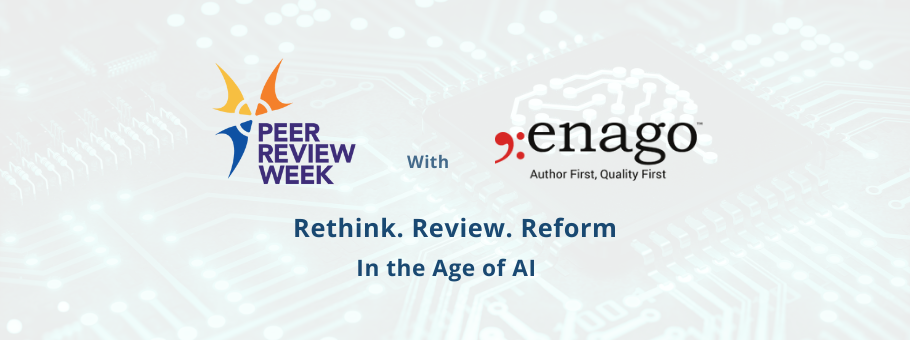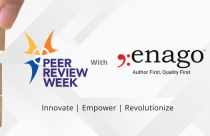Trust in Peer Review: From the Eyes of Authors, Reviewers & Editors (Part 2)

In the first part of this article, we had discussed how the Trust in Peer Review is interpreted among the key stakeholders of the society. We had also discussed as to why the Trust is so essential. In this second part, we shall discuss the issues related to peer review process/models that affect both authors and reviewers adversely and might need modifications.
Almost 80% manuscripts get rejected during peer review. Don’t let your manuscript be one of them. Avail Enago’s professional Pre-Submission Peer Review services. You never know you might get some additional discounts on the occasion of the Peer Review Week! Do check it out!
Authors and the Long Peer Review Process
“I am a scientist with 20-years of scholar experience and as such, I habitually deal with the process of peer review from its both sides – as a scientist who wants her results to be published in high-level journals and as a peer reviewer who regularly volunteers in scholarly journals. Hence, from the two I can now highlight the pros and cons of the peer-review process.
Pros: The peer review is one of the most important levels for filtering and publishing of academic articles, books and book chapters in high-level scholar magazines. It is an essential step for quality control measure of our work and a necessary step to get published in excellent journals. The last is a prerequisite for the dissemination of results and their reproduction by colleagues. In many cases, the peer-reviewing enhances the quality of the work and gives us a perspective which we could not see before.
Cons: There are a couple of cons in the process of peer review though:
1) Every so often it is done by specialists who are not very proficient in the topic they review and as such, they reject the paper without many thinking.
2) The process is slow, in some journals takes months.
3) The so-called special interest groups or certain circles of specialists in a particular field who by being peer reviewers quite regularly reject a paper due to its inconsistency with their alliance is a big hinder. Believe me, this happens often and thus eliminates our possibilities to get published.”
Dr. Milena Georgieva
Associate Professor in Molecular Biology, Institute of Molecular Biology, Bulgarian Academy of Sciences
Should You Trust the Reviewers?
Peer review seeks to ensure scientific integrity and build this trust. All good journals use peer review to decide whether or not an article is suitable for publication. Peer reviewers should be established researchers with a great deal of expertise in their field. They check that submitted papers are accurate, clear and complete which is a critical part of the publication journey. The report provided by the peer reviewers should also be unbiased to both the journal and the author of the paper.
Co-Writing & Ghost Writing Peer Review Reports
There are instances, however, when this bond of trust appears to have been compromised. A study, reported by Science some time back, suggested that the peer review reports were written early career researchers (ECRs) on behalf of their Principal Investigators (PIs). The survey included responses from almost 500 scientists with respect to the peer review reports. Around 80% of respondents said that ghost-writing a peer review for a Principal Investigator (PI) was ethically wrong. Despite this, half said that they had ghost-written at least one peer review. Three-quarters of respondents had “co-reviewed.” This meant they had provided text or ideas for a peer review without being named as an author. In fact, as much as 95% of the respondents felt that this was a useful form of training in peer review, and 73% thought that it was ethical. In total, 79% of the postdocs and 57% of the graduate students who responded to the survey had contributed ideas and/or text to peer reviews written under their PI’s name. Although the study was mostly conducted in North America, with the respondents being mostly from the field of Life Sciences, this clearly showed that co-reviewing and ghost-writing might be common practices in the global academic community as well.
Underrepresentation of Women & ESL Researchers in the Review Board
Reviewers too, accuse the academic community of unfairness. Unequal representation among the reviewers is quite common in academia and several studies have confirmed this. One such study, published in eLife, clearly showed how women have been underrepresented among the review boards of journals. The study looked at all submissions made eLife between the years 2012 to 2017 — nearly 24,000 in total. It was observed that women worldwide, and researchers outside North America and Europe, were less likely to be peer reviewers, editors and last authors. The paper was published on the preprint server bioRxiv1. The researchers found that women make up only around 20% of peer reviewers, and around one in four reviewing editors.
The same study also highlighted another major issue of underrepresentation, that of the ESL reviewers. According to the study, most reviewing editors and reviewers were in the United States — 62% and 56%, respectively — followed by the United Kingdom and Germany in second and third place. Less than 2% of peer reviewers were in developing nations — all in China, India or South Africa.
Similar trends have been observed from the Publons Global State of Peer Review Report. The report shows that researchers in the US provide 32.9% of all reviews, worldwide. Surprisingly, this figure is even higher than the proportion of articles written by US researchers. Altogether, the US supplies 25.4% of published articles. At the other end of the scale, China provides only 8.8% of reviews, despite producing 13.8% of articles. Researchers in China provide a similar number of reviews to those in the UK, but submit more than twice as many manuscripts. China actually submits almost as many manuscripts as the US, yet the discrepancy. This trend can be seen across the world. In general, established countries – particularly the US, Australia, and Europe – review more than emerging regions, relative to their article outputs. Emerging regions include India, China, Turkey, and Iran.
Dr. Georgieva agrees to these cons. She also adds the following as some of the other cons from a peer reviewer’s perspective:
“1) Peer reviewing is time-consuming, the efforts are enormous and take a week of our time to read, understand, check and thus to amply review a manuscript (especially in the field of life sciences).
2) Peer reviewing is free of charge. This is quite inconsistent with the time we as reviewers work to write a quality review that not only filters the papers for the journal but also gives valuable suggestions to the scholars to improve their work.
In any case, the system for peer-review is indispensable to academic publishing and with joint efforts we have to try to improve it regularly.”
Dr. Milena Georgieva
Associate Professor in Molecular Biology, Institute of Molecular Biology, Bulgarian Academy of Sciences
How to Re-Build the Trust?
“Peer review, if done diligently, offers the reassurance that a scientific project or article has been subjected to one of more careful, independent assessments by subject experts. It doesn’t mean that the resulting output is flawless, but it should at least have passed detailed scientific scrutiny and offer a modicum of confidence that the methods used and the implications proposed follow robust scientific practice. Peer review does not provide the ultimate validation of a piece of scientific work, but its aim is to help authors improve their methods, results and presentation beyond any reasonable doubt. Peer-reviewed outputs can still be challenged; the peer reviewers may have missed subtle issues or new insights could overturn these results. While no single method of validating scientific work is completely foolproof, peer review provides at least an attempt at holding authors to account. In this context, the subset of so-called ‘predatory’ journals do a disservice to the scientific enterprise, since they do not contribute to robust improvements and validation of novel scientific results.”
Dr. Richard de Grijs
Associate Dean (Global Engagement) and Professor of Astrophysics, Macquarie University
Did the Pandemic Affect the Peer Review Process and the Trust in It?
“As a researcher and peer reviewer, the pandemic has not
changed much of the trust in peer review. I would rather think that the importance of peer review has been highlighted by the pandemic, which would increase the trust factor in peer review. Since peer review is not a job title and the monetary reward for peer review is mostly non-existent, one might rightly ask, “Why would anyone take on so much effort to study other people’s work, make suggestions for improvements, without being acknowledged or rewarded in a tangible way?” There might be a few different reasons why people make themselves available for such an undesirable task, but the most important incentive is most likely trust in peer review. Because peer reviewers know the trust that society has in peer review, they also understand the importance of making a contribution towards preserving that trust. Peer review is much more than just some feedback one gives to their colleagues. It is a service to humanity. With researchers battling the pandemic, this service has become as important as life itself.”
Dr. Jan M deBeer
Assistant Professor and Research Project Coordinator, Woosong University
There are both pros and cons to every process and peer review process is no exception. We might not like all of its aspects or models, yet we should choose to continue to maintain our trust in it and strive to make it better.
You can do your bit by participating in our Global Peer Review Survey and make your opinion count.






 “I am a scientist with 20-years of scholar experience and as such, I habitually deal with the process of peer review from its both sides – as a scientist who wants her results to be published in high-level journals and as a peer reviewer who regularly volunteers in scholarly journals. Hence, from the two I can now highlight the pros and cons of the peer-review process.
“I am a scientist with 20-years of scholar experience and as such, I habitually deal with the process of peer review from its both sides – as a scientist who wants her results to be published in high-level journals and as a peer reviewer who regularly volunteers in scholarly journals. Hence, from the two I can now highlight the pros and cons of the peer-review process. “Peer review, if done diligently, offers the reassurance that a scientific project or article has been subjected to one of more careful, independent assessments by subject experts. It doesn’t mean that the resulting output is flawless, but it should at least have passed detailed scientific scrutiny and offer a modicum of confidence that the methods used and the implications proposed follow robust scientific practice. Peer review does not provide the ultimate validation of a piece of scientific work, but its aim is to help authors improve their methods, results and presentation beyond any reasonable doubt. Peer-reviewed outputs can still be challenged; the peer reviewers may have missed subtle issues or new insights could overturn these results. While no single method of validating scientific work is completely foolproof, peer review provides at least an attempt at holding authors to account. In this context, the subset of so-called ‘predatory’ journals do a disservice to the scientific enterprise, since they do not contribute to robust improvements and validation of novel scientific results.”
“Peer review, if done diligently, offers the reassurance that a scientific project or article has been subjected to one of more careful, independent assessments by subject experts. It doesn’t mean that the resulting output is flawless, but it should at least have passed detailed scientific scrutiny and offer a modicum of confidence that the methods used and the implications proposed follow robust scientific practice. Peer review does not provide the ultimate validation of a piece of scientific work, but its aim is to help authors improve their methods, results and presentation beyond any reasonable doubt. Peer-reviewed outputs can still be challenged; the peer reviewers may have missed subtle issues or new insights could overturn these results. While no single method of validating scientific work is completely foolproof, peer review provides at least an attempt at holding authors to account. In this context, the subset of so-called ‘predatory’ journals do a disservice to the scientific enterprise, since they do not contribute to robust improvements and validation of novel scientific results.” changed much of the trust in peer review. I would rather think that the importance of peer review has been highlighted by the pandemic, which would increase the trust factor in peer review. Since peer review is not a job title and the monetary reward for peer review is mostly non-existent, one might rightly ask, “Why would anyone take on so much effort to study other people’s work, make suggestions for improvements, without being acknowledged or rewarded in a tangible way?” There might be a few different reasons why people make themselves available for such an undesirable task, but the most important incentive is most likely trust in peer review. Because peer reviewers know the trust that society has in peer review, they also understand the importance of making a contribution towards preserving that trust. Peer review is much more than just some feedback one gives to their colleagues. It is a service to humanity. With researchers battling the pandemic, this service has become as important as life itself.”
changed much of the trust in peer review. I would rather think that the importance of peer review has been highlighted by the pandemic, which would increase the trust factor in peer review. Since peer review is not a job title and the monetary reward for peer review is mostly non-existent, one might rightly ask, “Why would anyone take on so much effort to study other people’s work, make suggestions for improvements, without being acknowledged or rewarded in a tangible way?” There might be a few different reasons why people make themselves available for such an undesirable task, but the most important incentive is most likely trust in peer review. Because peer reviewers know the trust that society has in peer review, they also understand the importance of making a contribution towards preserving that trust. Peer review is much more than just some feedback one gives to their colleagues. It is a service to humanity. With researchers battling the pandemic, this service has become as important as life itself.”



